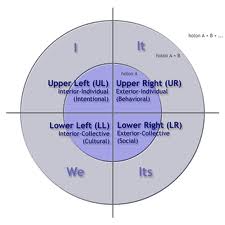Integral Life Practice or ILP is a comprehensive and holistic approach to leader self-transformation rooted in integral theory, developed by U.S. philosopher and writer, Kenneth Wilber II (born 1949). Wilber born in Oklahoma City, currently resides in Denver, CO, where he continues to study, write, and present his work primarily through the Internet and Colorado-based outlets, albeit on a limited basis due to a severe and chronic illness. He is the author of more than 30 books and countless articles on consciousness, mysticism, psychology, science, religion, and his integral theory, a comprehensive synthesis of Eastern and Western knowledge.
Wilber refers to his version of integral theory as AQAL, the abbreviated acronym for all quadrants, all levels (all lines, all states, all types, etc.). The elements of quadrants and levels refer to the key explanatory principles Wilber uses to examine the development of individual mind, body, soul, and spirit in self, culture, community, and nature. The four quadrants include the Upper Left or individual interior, the Upper Right or individual exterior, the Lower Left or collective interior, and the Lower Right or collective exterior (see Figure). Wilber further simplifies the four quadrants with the “three basic domains” of I, we, and it.
Figure: Integral Theory and AQAL

ILP, informed by Wilber’s AQAL, is an approach to enhanced personal wellness, development, self-actualization, and spiritual awakening. ILP addresses the whole person and all of life through four basic modules of practice and five auxiliary modules. The four foundational modules are body, mind, spirit, and shadow. The five auxiliary models are ethics, work, emotions, relationships, and soul (see Table).
An ILP approach to self-transformation does not include core practices per se. Rather, the ILP framework invites adherents to select at least one practice from each of the four core modules and to add practices from the auxiliary modules, as highlighted in the Table above. The practices listed in the matrix offer example practices for each module; however, options are not limited to those listed. Developers of the ILP approach outline five principles on which it builds:
· The Ultimate in Cross-Training, working synergistically in body, mind, and spirit in self, culture, and nature.
· Modular, allowing you to mix and match practices in specific areas or modules.
· Scalable, adjusting to however much—or little—time you have, down to 1-Minute Modules.
· Customizable to your lifestyle: you design a program that works for you and adapt it on an as-needed basis.
· Integral, based on AQAL technology, an All Quadrant, All Level framework for mapping the many capacities inherent in human beings (See Integral Life Practice by Wilber, Patten, Leonard, & Morelli, 2008).
Furthermore, all modules include Gold Star Practices, recommended as “distillations of traditional practices minus the religious and cultural baggage” (Wilber, Leonard, & Morelli, 2008). Also, quick versions of the Gold Star Practices, 1-Minute Modules, are offered for times when practitioners are pressed for time.
Table. Integral Life Practice Matrix

Source: The Integral Life Practice Matrix, by K. Wilber, 2007, retrieved from http://www.kenwilber.com/personal/ILP/MyILP.html
Integral Life Practice along with the Fourth Way, and Psychosynthesis (see previous essays) represent three different contemporary and universal systems of self-transformation. Mindfulness meditation, the transformative practice I focused on in my 2015 research and highlighted in Chapters 3 and 4 (of my book, Ten Developmental Themes of Mindful Leaders), is part of the Eightfold Path of Buddhism as well as an element of a growing body of secular Western approaches to stress management (e.g., Mindfulness Based Stress Reduction), and psychotherapy (e.g., Mindfulness Based Cognitive Therapy and Acceptance Commitment Therapy). While a primary purpose of this essay and my book is to inspire and support readers in embarking upon the inner journey of self-transformation, doing so is not without risks. Thus, I offer words of caution in my book and will also do so in a future blog essay.
This essay is an adapted excerpt from my book, “Ten Developmental Themes of Mindful Leaders.”
